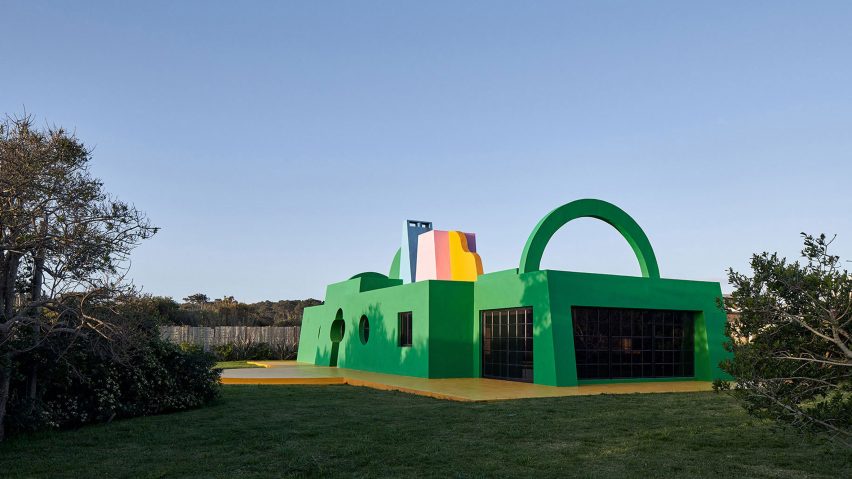Argentinian artist and designer Edgardo Giménez has created an artist residency in Uruguay called Casa Neptuna that features playful geometry and bright colours.
Casa Neptuna comprises an elongated one-storey structure made up of blocks and topped with decorative sculptural forms.
It is located in José Ignacio, a seaside town in Uruguay, on a residential lot dotted with trees, and was previously a residential structure.
Argentinian artist Edgardo Giménez was commissioned by Amalia Amoedo, an art collector who founded a residency through her Fundación Ama Amoedo (FAA).
"The residency program and Casa Neptuna were created simultaneously, in continuous dialogue and harmony," said FAA director Verónica Flom.
"In a way, the process of creating Casa Neptuna and its results are an example of the purpose of our residency program: that artists can have the time, space, and freedom to work on their practice," she told Dezeen.
"Edgardo wanted the house to be a space where one feels free to encourage creative thinking."
Casa Neptuna has living quarters for two artists, as well as a shared studio space, kitchen and common room.
Opting for local materials like plaster and brick, Giménez created an envelope made of interlocking geometries. The whole building sits on a yellow-painted platform, while the majority of the structure was painted a fluorescent green.
On top of the building are a series of sculptural decorative elements including two green arches that bookmark the elongated structure and a series of abstract forms in the middle painted yellow, blue and pink.
The bright colours reflect the well-known aesthetic of Giménez, who was a member of the Pop Art scene in Buenos Aires in the 1960s.
"It was Edgardo Giménez who decided the colors and all the aspects involving the design of Casa Neptuna," Flom told Dezeen.
"From the colors, the repetition of circular shapes in windows and arches, to his emblematic clover-shaped door, are clear examples of his personal signature."
While the exterior is vibrant and comes across as a piece of fine art in itself, the interiors are decidedly more minimal.
The interior is characterised by white walls and black metallic accents that frame the porthole windows as well as the floor-to-ceiling windows of the studio.
According to Flom, this approach was taken in order to "encourage concentration and a more focused atmosphere" for the artists-in-residence.
Giménez was born in 1942 in Argentina and is known for his visual art, furniture and fashion design. He has completed a number of other residences in and around Buenos Aires, including a home called Casa Azul for art critics Jorge Romero Brest and Marta Bontempi.
Other structures that have exteriors with vibrant colours and sculptural forms include Bolivian architect Freddy Mamani's abstract creations in La Paz and Javier Senosian's housing complex in Mexico that takes the form of a colourful serpent.
The photography is by Cristobal Palma.

